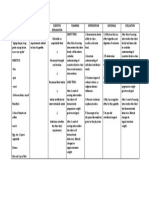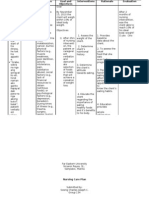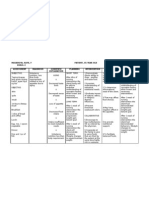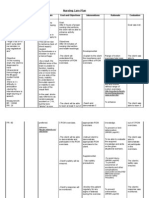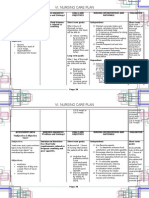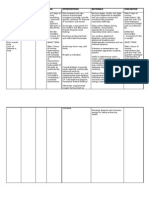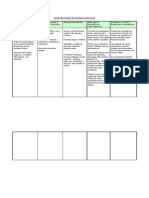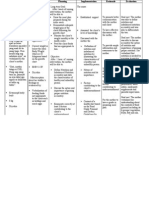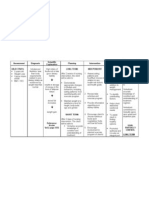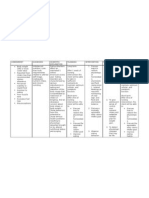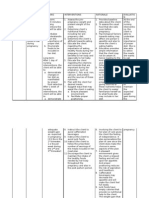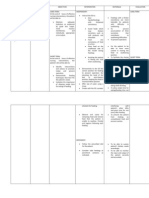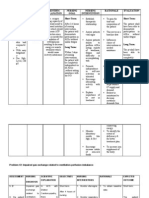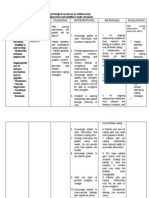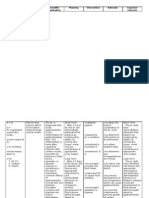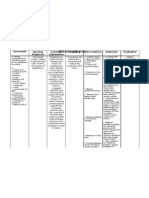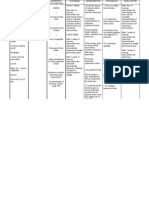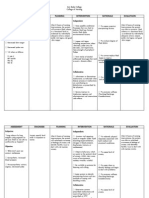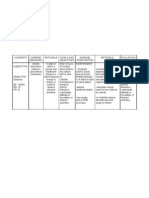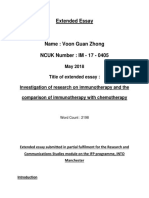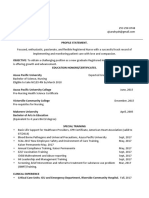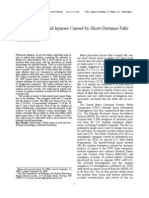NCP Imbalanced Nutrition
NCP Imbalanced Nutrition
Uploaded by
Ruby AnneCopyright:
Available Formats
NCP Imbalanced Nutrition
NCP Imbalanced Nutrition
Uploaded by
Ruby AnneOriginal Description:
Original Title
Copyright
Available Formats
Share this document
Read this document in other languages
Did you find this document useful?
Is this content inappropriate?
Copyright:
Available Formats
NCP Imbalanced Nutrition
NCP Imbalanced Nutrition
Uploaded by
Ruby AnneCopyright:
Available Formats
CUES
PROBLEM
SCIENTIFIC REASON Nutritional deficiencies primarily affect gastrointestinal disorder or due to the procedures prior and after surgeries.
DESIRED OUTCOME Short term goal: After 6 hours of nursing interventions client will verbalize understanding of causative factors and necessary interventions to promote optimum nutrition.
INTERVENTION/ RATIONALE Ascertain understanding of individual nutritional needs. To determine informational needs of client. Assess weight, measure or calculate body fat and muscle mass and other anthropometric measurements. To establish baseline parameters. Observe for absence of subcutaneous fat and muscle wasting, hair loss, fissuring of nail, delayed healing of wounds, gum bleeding or swollen abdomen. Indicates proteinenergy
EVALUATION STANDARD CRITERIA
Subjective: Puro liquids lang ang kinakain ko. As verbalized by the patient.
Risk for imbalanced nutrition: less than body requirement related to Objective: restriction of residue Presence of containing stoma in the foods. left lower quadrant of the abdomen With NGT inserted Limited ROM
(Source: http://www.scribd Long term goal: .com/doc/101291 785/8NCP-s-for- After 1-2 days of colostomy) nursing interventions client will be able to demonstrate behaviors, lifestyle changes to regain and maintain appropriate nutrition intake.
Client has a Client proper demonstrates nutritional behaviors and status. lifestyle changes that regains and maintains appropriate nutrition intake.
malnutrition. Auscultate bowel sounds. Note characteristic of stool (color, amount, frequency) Provide diet modification as indicated. (formula tube feedings, parenteral nutrition infusion) Instruct client to avoid foods that causes intolerance or increase gastric motility according to individual needs. Limit fiber or bulk, if indicated. Because it may lead to early satiety. Assist with or provide oral care before and after meals and at bedtime. Promote adequate and timely fluid intake.
Weight regular and graph results. To monitor effectiveness of efforts and dietary plans. Evaluate total daily food intake. Obtain diary or calorie intake, patterns and times of eating. To reveal possible cause of malnutrition and changes that could be made in clients intake.
You might also like
- GIDA List Updating 2023Document49 pagesGIDA List Updating 2023Neil Victor Ongco Pajugot100% (1)
- NCP Risk For Imbalanced NutritionDocument2 pagesNCP Risk For Imbalanced NutritionBianca Watanabe - Ratilla70% (10)
- NX 3.0.22.00 - NX 4.0.22.00 - Service Manual (Service Manual For Download) PDFDocument772 pagesNX 3.0.22.00 - NX 4.0.22.00 - Service Manual (Service Manual For Download) PDFkb mensurar100% (3)
- Enteral Feeding Nursing Care PlanDocument2 pagesEnteral Feeding Nursing Care PlanCyrus De Asis93% (15)
- 5 Altered Nutrition Less Than Body Requirements Chronic Renal Failure Nursing Care PlansDocument3 pages5 Altered Nutrition Less Than Body Requirements Chronic Renal Failure Nursing Care Plansjustin_sane50% (6)
- Nursing Care Plan For Imbalanced Nutrition Less Than Body Req NCPDocument4 pagesNursing Care Plan For Imbalanced Nutrition Less Than Body Req NCPderic84% (69)
- Imbalance Nutrition Less Than Body Requirements Related To Loss of AppetiteDocument1 pageImbalance Nutrition Less Than Body Requirements Related To Loss of AppetiteSenyorita KHaye89% (9)
- NCP Stomach CancerDocument2 pagesNCP Stomach CancerJohn Derick BangsoyNo ratings yet
- Pitman 1987 - A Cybernetic Model of OCDDocument10 pagesPitman 1987 - A Cybernetic Model of OCDAndrei PredaNo ratings yet
- BSBOPS504 Student Project Portfolio - Jacob Lloyd JonesDocument21 pagesBSBOPS504 Student Project Portfolio - Jacob Lloyd JonesBui An100% (7)
- NCP Imbalanced NutritionDocument2 pagesNCP Imbalanced Nutritioncj_080882% (22)
- Imbalanced Nutrition Less Than Body RequirementsDocument2 pagesImbalanced Nutrition Less Than Body RequirementsFrudz Orjaleza100% (1)
- Imbalance Nutrition Less Than Body Requirements Related To Loss of Appetite Due To Aging.Document1 pageImbalance Nutrition Less Than Body Requirements Related To Loss of Appetite Due To Aging.Senyorita KHaye78% (9)
- Activity Intolerance Related To Decrease Blood FlowDocument3 pagesActivity Intolerance Related To Decrease Blood FlowDarkCeades100% (3)
- Imbalanced Nutrition Less Than Body Requirements - Diabetes - NCPDocument5 pagesImbalanced Nutrition Less Than Body Requirements - Diabetes - NCPJulie Ann Jimenez Manlangit50% (4)
- NCP Imbalanced NutritionDocument4 pagesNCP Imbalanced NutritionChelsea Wu100% (2)
- NCP On Electrolyte ImbalanceDocument4 pagesNCP On Electrolyte Imbalancefreyah_bc67% (3)
- NCP Loss of AppetiteDocument2 pagesNCP Loss of AppetiteIris Balino100% (1)
- Nursing Care PlanllDocument5 pagesNursing Care Planllbbarnes0912No ratings yet
- NCP Imbalanced NutritionDocument3 pagesNCP Imbalanced NutritionRuby Anne100% (9)
- Merck & Company Product - Decision TreeDocument11 pagesMerck & Company Product - Decision TreeIgor SoaresNo ratings yet
- NCP 3A Nutritional Imbalance Less ThanDocument3 pagesNCP 3A Nutritional Imbalance Less ThanCee Sanchez100% (3)
- Imbalanced Nutrition - Less Than Body Requirements 02Document7 pagesImbalanced Nutrition - Less Than Body Requirements 02AgronaSlaughterNo ratings yet
- Enteral Feeding Nursing Care PlanDocument2 pagesEnteral Feeding Nursing Care PlanChebz Zy0% (1)
- NCP-Imbalanced Nutrition Less Than Body RequirementsDocument2 pagesNCP-Imbalanced Nutrition Less Than Body RequirementsJon Eric G. Co84% (37)
- NCP Imbalanced NutritionDocument2 pagesNCP Imbalanced NutritionLyka Ngayan88% (8)
- Imbalanced NutritionDocument2 pagesImbalanced NutritionLaura Sansonetti100% (1)
- Imbalanced NutritionDocument2 pagesImbalanced NutritionmarielfmerlanNo ratings yet
- Imbalanced Nutrition NCPDocument3 pagesImbalanced Nutrition NCPBea Dela CenaNo ratings yet
- Nursing Care Plan Imbalanced Nutrition Less Than Body ReqDocument4 pagesNursing Care Plan Imbalanced Nutrition Less Than Body ReqMarife Lipana Reyes43% (7)
- NCP - Imbalanced Nutrition Less Than Body Requirements Related To Poor Dietary Intake As Evidenced by Weight Less Than NormalDocument2 pagesNCP - Imbalanced Nutrition Less Than Body Requirements Related To Poor Dietary Intake As Evidenced by Weight Less Than NormalMeroy Cleofe67% (9)
- Imbalanced Nutrition Less Than Body Requirements Related To Altered Image, Inadequate Nutrient Intake, and Chronic Vomiting.Document2 pagesImbalanced Nutrition Less Than Body Requirements Related To Altered Image, Inadequate Nutrient Intake, and Chronic Vomiting.Senyorita KHaye100% (1)
- NCP NutritionDocument2 pagesNCP NutritionBuhkz HermosoNo ratings yet
- Imbalanced Nutrition NCPDocument3 pagesImbalanced Nutrition NCPapi-3701489100% (6)
- Knowledge Deficit Related To HypertensionDocument2 pagesKnowledge Deficit Related To HypertensionChenee Mabulay100% (1)
- NCP Imbalanced Nutrition Less Than Body RequirementsDocument5 pagesNCP Imbalanced Nutrition Less Than Body Requirementsrusnani100% (1)
- Impaired SwallowingDocument2 pagesImpaired Swallowingwilz3390% (10)
- Activity Intolerance NCPDocument6 pagesActivity Intolerance NCPDoo NahNo ratings yet
- Nutrition NCPDocument3 pagesNutrition NCPMarielle Adrienne Bitancor100% (1)
- NCP - Imbalanced Nutrition Less Than Body RequirementsDocument4 pagesNCP - Imbalanced Nutrition Less Than Body RequirementsKaye Nicole Lugo83% (6)
- Imbalanced Nutrition NCPDocument2 pagesImbalanced Nutrition NCPMarielle ChuaNo ratings yet
- Ncp-Imbalanced Nutrition Less Than Body RequirementsDocument3 pagesNcp-Imbalanced Nutrition Less Than Body RequirementsAllan Maglente63% (8)
- NCP Imbalanced NutritionDocument3 pagesNCP Imbalanced NutritionAav Canlas100% (1)
- Impaired Physical Mobility NCPDocument2 pagesImpaired Physical Mobility NCPMick De Leon67% (3)
- Imbalanced Nutrition - Less Than Body Requirements 01Document6 pagesImbalanced Nutrition - Less Than Body Requirements 01AgronaSlaughterNo ratings yet
- NCP Risk For Fluid Volume DeficitDocument2 pagesNCP Risk For Fluid Volume DeficitJeanineReyes44% (9)
- Imbalanced Nutrition NCPDocument2 pagesImbalanced Nutrition NCPChryst Louise Saavedra100% (1)
- Imbalance Nutrition Less Than Body RequirementsDocument4 pagesImbalance Nutrition Less Than Body Requirementshatred heartNo ratings yet
- Nursing Care Plan For Imbalanced Nutrition Less Than Body Req NCPDocument4 pagesNursing Care Plan For Imbalanced Nutrition Less Than Body Req NCPkarthi karthi50% (2)
- NCP On Imbalanced Nutrition: Less Than A Body Requirements R/T Inability To Ingest FoodDocument1 pageNCP On Imbalanced Nutrition: Less Than A Body Requirements R/T Inability To Ingest FoodErle Gray CadangenNo ratings yet
- Nursing Care Plan Date/Shift Assessment Needs Nursing Diagnosis Objective of Care Nursing Intervention EvaluationDocument3 pagesNursing Care Plan Date/Shift Assessment Needs Nursing Diagnosis Objective of Care Nursing Intervention EvaluationMercy Semblante DiazNo ratings yet
- NCP 1Document1 pageNCP 1hsiriaNo ratings yet
- Imbalance Nutrition Lass Than Body Requirements Related To Loss of Appetite Due To Aging 2Document2 pagesImbalance Nutrition Lass Than Body Requirements Related To Loss of Appetite Due To Aging 2Senyorita KHaye100% (1)
- NCP (Deficient Fluid VolumeDocument3 pagesNCP (Deficient Fluid VolumeNica RespondoNo ratings yet
- Activity IntoleranceDocument1 pageActivity IntoleranceJoshua D. Garcia100% (1)
- NCP HypokalemiaDocument2 pagesNCP HypokalemiaJoyVee Pillagara-De Leon40% (5)
- Angelam - LTC Case StudiesDocument6 pagesAngelam - LTC Case Studiesapi-257604563No ratings yet
- Basic Nutrition and Nutritional TherapyDocument48 pagesBasic Nutrition and Nutritional TherapyknotstmNo ratings yet
- Patient Education For Patient With Anorexia NervosaDocument2 pagesPatient Education For Patient With Anorexia NervosaRidha Ramdani RahmahNo ratings yet
- Nutritional AssessmentDocument5 pagesNutritional AssessmentimnasNo ratings yet
- Malnutrition NCPDocument4 pagesMalnutrition NCPDenise Espinosa100% (3)
- Nutrition For The Pediatric Surgical PatientDocument27 pagesNutrition For The Pediatric Surgical PatientMahmoud HasanNo ratings yet
- Geri - Nutrition Study GuideDocument5 pagesGeri - Nutrition Study GuideMonica Castillo MearesNo ratings yet
- NCP and Problems FinalDocument8 pagesNCP and Problems FinalRina CebreroNo ratings yet
- Week 9Document3 pagesWeek 9HeinzzzNo ratings yet
- AdimeDocument4 pagesAdimeapi-294212644No ratings yet
- Fluid Volume DeficitDocument2 pagesFluid Volume DeficitRuby AnneNo ratings yet
- NCP Impaired SkinDocument3 pagesNCP Impaired SkinRuby AnneNo ratings yet
- Fluid Volume DeficitDocument2 pagesFluid Volume DeficitRuby AnneNo ratings yet
- NCP Impaired SkinDocument3 pagesNCP Impaired SkinRuby AnneNo ratings yet
- Meddco AmbulanceDocument10 pagesMeddco AmbulancemeddcoambulanceNo ratings yet
- Introductiontocompletedenture April102022Document18 pagesIntroductiontocompletedenture April102022sanusifriday6No ratings yet
- Zuhr2017 J.qi.a38706Document14 pagesZuhr2017 J.qi.a38706André Pinheiro de AraújoNo ratings yet
- SaturnDocument113 pagesSaturnm.s.subramania sharma100% (2)
- 10b The SuperhumansDocument2 pages10b The SuperhumansEl mundo de sofyNo ratings yet
- The Invention of Penicillin: Taken From: Pathway To English Chapter 8Document3 pagesThe Invention of Penicillin: Taken From: Pathway To English Chapter 8Khoerudin KhoerudinNo ratings yet
- Sonac ProdutosDocument5 pagesSonac Produtosana carolina biggersNo ratings yet
- Culminating ActivityDocument3 pagesCulminating ActivityJane HembraNo ratings yet
- Career Intake & Counseling Scale Administrator's GuideDocument20 pagesCareer Intake & Counseling Scale Administrator's GuideRowanNo ratings yet
- A Serum Autoantibody Marker of Neuromyelitis Optica: Distinction From Multiple SclerosisDocument7 pagesA Serum Autoantibody Marker of Neuromyelitis Optica: Distinction From Multiple SclerosistiaraleshaNo ratings yet
- Investigation of ImmunotherapyDocument10 pagesInvestigation of Immunotherapyvoon_zhongNo ratings yet
- Trans Defense A Ebook For The Defense of Transgender Men and Women - RemovedDocument112 pagesTrans Defense A Ebook For The Defense of Transgender Men and Women - RemovedMarie Landry's Spy ShopNo ratings yet
- Acute Renal FailureDocument21 pagesAcute Renal Failureاحمد الهاشميNo ratings yet
- Project Report Covid 19 Analysis TutorialaicsipDocument19 pagesProject Report Covid 19 Analysis Tutorialaicsipabhayku1689No ratings yet
- Blood Clotting DisordersDocument2 pagesBlood Clotting DisordersPopi Bunga RopikohNo ratings yet
- ResumeDocument3 pagesResumeapi-383804230No ratings yet
- Psychological Impact of Skin Disorders On Patients Self Esteem and Perceived Social SupportDocument9 pagesPsychological Impact of Skin Disorders On Patients Self Esteem and Perceived Social Supportstarn.serventisNo ratings yet
- 2014-2015 Cheer ContractDocument14 pages2014-2015 Cheer Contractapi-240118616No ratings yet
- Ferrans and Powers Quality of Life Index Diabetes Version - IiiDocument4 pagesFerrans and Powers Quality of Life Index Diabetes Version - IiiDaniela IpateNo ratings yet
- HappinessDocument2 pagesHappinessshuklashubhamNo ratings yet
- Philippine Drug Enforcement Agency: 2.1. LogoDocument8 pagesPhilippine Drug Enforcement Agency: 2.1. LogoJerrymiah.maligon67% (3)
- Plunkett Fatal Pediatric Head Injuries Caused by Short-Distance Falls Am J Forens Med Pathol 2001-22 1-12Document14 pagesPlunkett Fatal Pediatric Head Injuries Caused by Short-Distance Falls Am J Forens Med Pathol 2001-22 1-12Henry SteinbergNo ratings yet
- 22 - Disease Biology PDFDocument28 pages22 - Disease Biology PDFashutosh samalNo ratings yet
- AmpicillinDocument1 pageAmpicillinIvanne Hisoler100% (1)
- A Guide To Neurodiversity in The Early YearsDocument38 pagesA Guide To Neurodiversity in The Early Yearsjuanpablo1980No ratings yet






